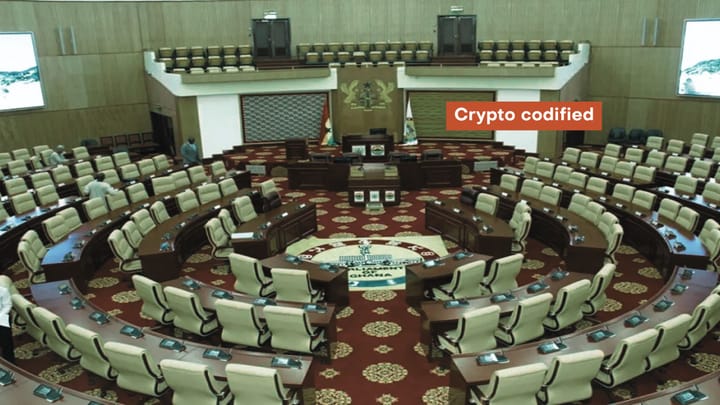🟠 Nigeria and South Africa exit FATF’s grey list
Plus: 🌍 Nigeria, South Africa and two other African countries exit FATF’s grey list 🇿🇦 Ripple to provide digital assets custody services for Absa’s users 🇰🇪 Kenya edges toward crypto regulation as parliament passes VASP bill

Here’s what made the news last week:
🌍 Nigeria, South Africa and two other African countries exit FATF’s grey list 🇰🇪 Tether invests in Kotani Pay
🇰🇪 Kenya edges toward crypto regulation as parliament passes VASP bill
📌 Don’t miss:
The Catch Up section for other stories you may have missed.
Let’s dive in!
Nigeria and South Africa exit FATF’s grey list

Topline: Nigeria, South Africa, Burkina Faso, and Mozambique have been removed from the FATF’s grey list after successfully addressing gaps in their anti-money laundering and counter-terrorism financing (AML/CFT) frameworks. (Details)
The details: The FATF said the countries have resolved all previously identified gaps in their anti-money laundering and AML/CFT frameworks.
- Burkina Faso, added to the list in 2021, completed ten action points — including sanctions against known terrorist financiers and expanded rules for reporting suspicious transactions.
- Mozambique addressed nine risk factors outlined in 2022, improving inter-agency collaboration and boosting AML/CFT capacity.
- Nigeria and South Africa, both grey listed in 2023, strengthened risk-based supervision and ramped up investigations into complex cases of money laundering and terrorism financing.
What was said:
“This plenary has been very positive, a positive story for the continent of Africa,” said Elisa de Anda Madrazo, FATF president.
“Delisting from the grey list sends a strong signal to investors that Nigeria has made significant progress,” said Emomotimi Agama, director-general of Nigeria’s Securities and Exchange Commission.
Why it matters: Grey listed countries face reputational risks and reduced access to global finance, as banks and investors often scale back exposure.
- The IMF estimates that such countries lose up to 7.6% of GDP in total capital inflows while under FATF monitoring.
Kenya edges closer to crypto regulation as parliament passes VASP Bill

Topline: Kenya is getting closer to formally regulating its crypto industry. The country’s National Assembly has passed the Virtual Asset Service Providers (VASP) Bill 2025, a law that sets clear rules for the operation of digital asset businesses.
The bill now awaits the president’s signature before becoming law. (Details)
Here’s what’s inside:
- Licensing: All VASPs must obtain an annual license to operate in Kenya.
- Local presence: Companies must have a physical office in the country — operating remotely will no longer cut it.
- AML compliance: VASPs will be required to report high-value transactions and to comply with anti-money laundering (AML) and counter-terrorism financing (CFT) laws.
- Penalties: Those who fail to comply could face fines of up to KSh 25 million (≈ $194,000) or lose their licenses.
The law gives companies one year to comply once it’s enacted.
The backstory: Earlier drafts of the bill sparked significant pushback within Kenya’s crypto ecosystem.
- Lawmakers initially proposed creating a new regulator — the Virtual Assets Regulatory Authority (VARA) — with ties to industry groups, including one perceived to be aligned with Binance.
- After intense lobbying from local crypto advocates, parliament dropped the idea of VARA and instead handed regulatory oversight to the Capital Markets Authority (CMA) and the Central Bank of Kenya (CBK).
- It’s worth noting that this same coalition of industry players successfully pushed for the reversal of Kenya’s digital asset tax earlier this year.
- If the president signs the bill, Kenya will become one of the few African countries with a comprehensive legal framework for crypto activities.
Tether invests in Kotani Pay

Topline: Tether, the world’s largest stablecoin issuer, has made a strategic investment in Kotani Pay, a Kenyan company that provides on- and off-ramp infrastructure connecting Web3 users to local payment systems across Africa. (Details)
Quick facts: Kotani Pay’s platform bridges blockchain and mobile money channels, helping users and businesses access digital assets and cross-border payments.
- The investment aims to reduce transaction costs, shorten settlement times, and expand access to global liquidity for African SMEs and corporates.
- Kotani Pay already operates across multiple markets, offering tools that support remittances, payroll, and local currency settlements.
What they said:
“Kotani Pay’s vision and strong regional presence make it the right fit to drive our shared goals in Africa,” said Paolo Ardoino, Tether CEO.
“This investment positions us to continue connecting millions of Africans to the global financial system,” added Felix Macharia, Kotani Pay CEO and co-founder.
Why it matters: While funding for African crypto startups contracted during the 2022-2023 bear market, infrastructure players are now attracting capital again as on-chain activity surges.
- Kredete, the African fintech and cross-border remittance firm, raised $22 million in a Series A funding round last month.
- Tether has also deepened its presence in Africa through several 2025 partnerships and investments with brands, institutions, and crypto startups, including Mansa, Zanzibar, Quidax, and the Republic of Guinea.
Catch up

🇺🇬 Uganda launches CBDC pilot in $5.5 billion tokenization drive (Mariblock)
🌍 Africa moved $54 billion in stablecoins; now what? (Mariblock)
🇿🇦 Ripple to provide digital assets custody services for Absa’s users (Mariblock)
🌍 Unlocking Africa’s next economy would require new money (Mariblock)
That’s all for this week!
If you found this helpful, please consider sharing it with a friend or colleague or forwarding it online.
Till next week,
Ogechi.



